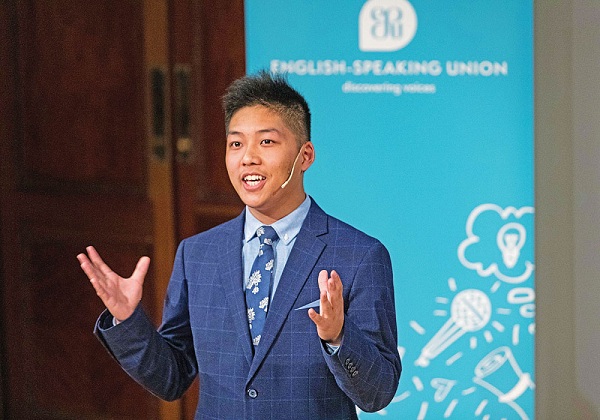Chinese contestants impress judges at speaking competition

Fan Yuehang, 17-year-old from China's Nanjiang Foreign Language School, delivers his speech at the final of the International Public Speaking Competition 2019 in London on Friday. [Photo provided to China Daily]
The ability to tell a story confidently while engaging with the audience is what makes a good public speaker, according to a judge at the International Public Speaking Competition 2019, which saw two Chinese students finish in the top six.
Chen Yixian, a 19-year-old from Tsinghua University, and Fan Yuehang, a 17-year-old from Nanjiang Foreign Language School, broke into the grand final of the competition, which is organized by the English-Speaking Union. This year's event featured 54 participants from more than 52 countries and regions.
The pair lost out to Spain's Ennio Campoli Patak, who ended up the overall winner, and Australia's Justin Lai, who was runner-up in Friday's final, which was held at the Royal Institution in central London.
The two Chinese participants impressed the judges and won plaudits from members of the audience for their eloquent speech and well-orated delivery.
Jon Briggs, lead judge of the final competition, commended them, adding that "anybody who makes a presentation on that level, with that level of ability to propose an argument in a language that is not their own, is extremely competent and able, and I take my hat off to them".
Briggs went on to say the Chinese students did not lack anything needed to win the competition but that the decision as to who ended up winning was a very personal view among the three judges about what they felt makes a good presenter, given how competent the story was being told, how well the contestants argued their stories, and whether the narrative had enough relation to the initial topic about the nature of a common language.
"Given a different topic on a different day, it might've well worked out differently, purely because of the style and the level of performance," Briggs added. "They are every bit as capable as the others, but on the day, the style and content shown by two of the other competitors outshined the Chinese contestants."
The China leg of the competition, the 21st Century Cup, was launched in 1996 by China Daily. Liu Xin and Xia Peng, China's national champions in 1996 and 2005 respectively, both went on to win the international competition.
One of the Chinese finalists, Fan, said his preparation was not that extensive, due to limited time, which resulted in a few bumps, but he said he ended up doing his best.
"I was not nervous, given the circumstances, because the atmosphere was good. The light was orange and it was very harmonious. Also because, maybe, I have gone to the stages so many times and got used to it," Fan said.
He added that a good public speaker needs imagination and the ability to control emotion.
"You have to think of something that is out of box, or something good, and that requires imagination to observe life, and to understand what's really going on around you and to make better use of the environment," he said. "On stage, you never know what is going to happen, especially at the Q&A session, so it's really important to control your emotions, and to calmly listen to what the audience is going to ask, and then I think that would help."
During the weeklong international contest in London, the contestants were given the opportunity to spend time together and went on an excursion to the famous Shakespeare's Globe Theater. They were also given speech coaching by Royal Institution experts.
Jane Easton, director-general of the English-Speaking Union, said the standards of English-speaking ability in China have risen consistently in recent years.
"It's lovely to see the Chinese students in the final and I think they've done superbly well," she said.
Easton said one thing that she noticed from all countries, including the participants from China, was that "they really care and think hard about those people whom they are communicating with".
"Through that, it allows them to make speeches, which is really true with those in their audiences," she said.
She believes a compelling topic, plus real engagement with the audience, as well as varied language, all help to make a very good speech.








